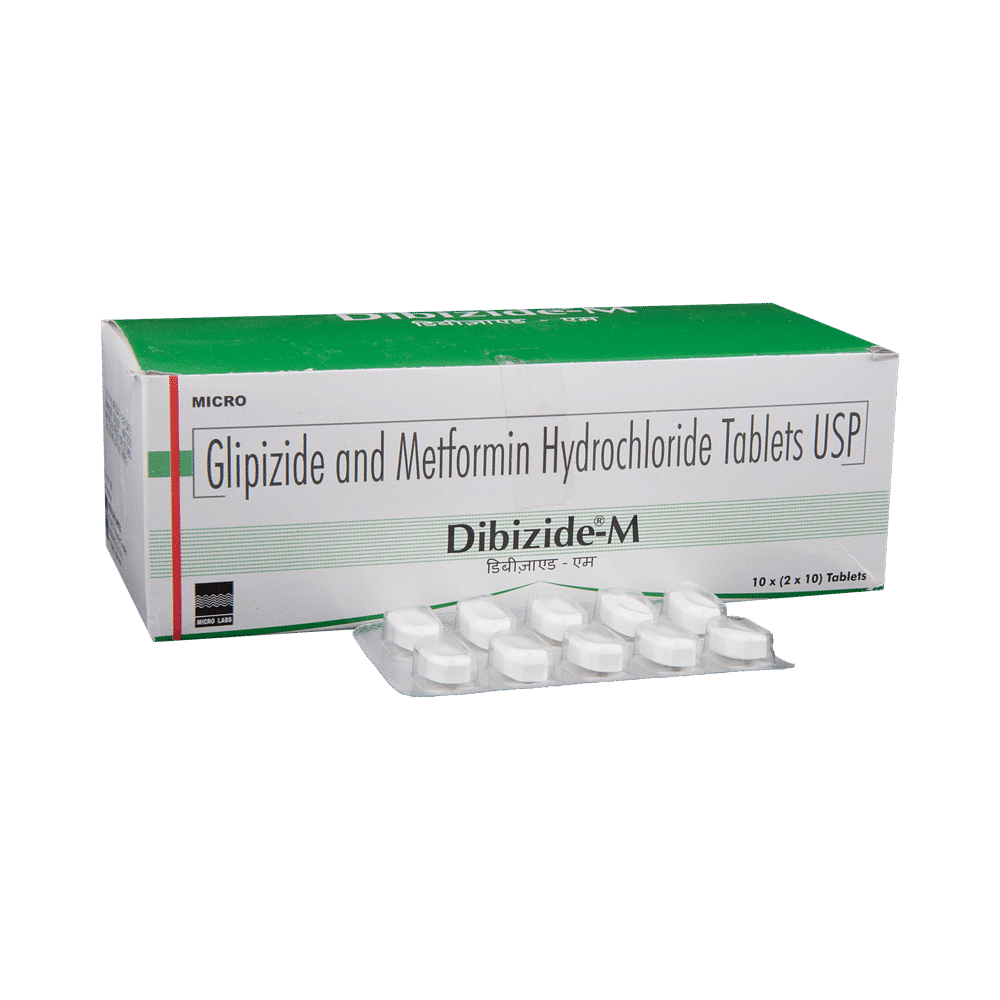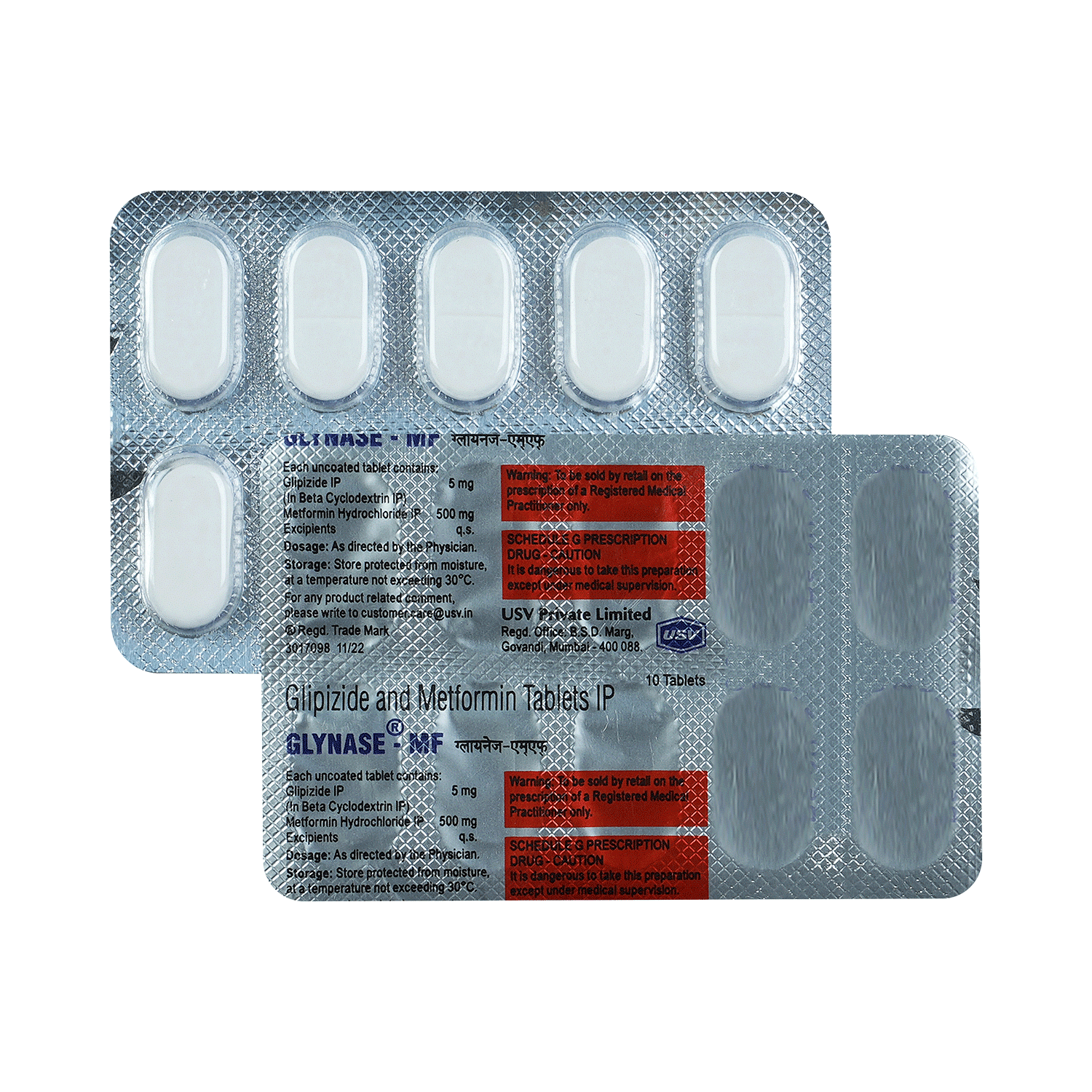
Gpzide M 5mg/500mg Tablet
Manufacturer
Ronak Laboratories
Salt Composition
Glipizide (5mg) + Metformin (00mg)
Key Information
Short Description
Gpzide M 5mg/500mg Tablet is a combination of two medicines used to treat type 2 diabetes mellitus in adults. It helps control blood sugar levels in people with diabetes.
Dosage Form
Tablet
Introduction
Gpzide M 5mg/500mg Tablet should be taken with food. Take it regularly at the same time each day to get the most benefit. Your doctor will decide what dose is best for you and this may change from time to time according to how it is working according to your blood sugar levels. Keep taking this medicine even if you feel well or your blood sugar levels are controlled. If you stop it without consulting your doctor, your blood sugar levels could rise and put you at risk of kidney damage, blindness, nerve problems and loss of limbs. Remember that it is only part of a treatment program that should also include a healthy diet, regular exercise, and weight reduction as advised by your doctor. Your lifestyle plays a big part in controlling diabetes.
Directions for Use
Take this medicine in the dose and duration as advised by your doctor. Swallow it as a whole. Do not chew, crush or break it. Gpzide M 5mg/500mg Tablet is to be taken with food.
Safety Information
Side Effects
The most common side effect of Gpzide M 5mg/500mg Tablet is low blood glucose levels (hypoglycemia). Make sure you recognize the signs of having low blood glucose levels such as sweating, dizziness, headache, and shaking and know how to deal with it.
Alcohol Warning
It is unsafe to consume alcohol with Gpzide M 5mg/500mg Tablet.
Breastfeeding Warning
Gpzide M 5mg/500mg Tablet is probably unsafe to use during breastfeeding. Limited human data suggests that the drug may pass into the breastmilk and harm the baby.
Pregnancy Warning
Gpzide M 5mg/500mg Tablet may be unsafe to use during pregnancy. Although there are limited studies in humans, animal studies have shown harmful effects on the developing baby. Your doctor will weigh the benefits and any potential risks before prescribing it to you. Please consult your doctor.
How it works
Gpzide M 5mg/500mg Tablet is a combination of two antidiabetic medicines: Glipizide and Metformin.
Quick Tips
Monitor your blood sugar level regularly while you are taking this medicine. Inform your doctor about your diabetes treatment if you are due to have surgery under a general anesthetic. Tell your doctor immediately if you experience any deep or rapid breathing or if you have persistent nausea, vomiting, and stomach pain as Gpzide M 5mg/500mg Tablet may cause a rare but serious condition called lactic acidosis which is an excess of lactic acid in the blood.
Related Medicines

Diacon M 5 mg/500 mg Tablet

Glimet DS Tablet

Dibizide-M Tablet

Glynase-MF Tablet

Glibetic MF 5mg/500mg Tablet

Bionase MF 5 mg/500 mg Tablet

Gluconil MF 5mg/500mg Tablet

Metazide 5mg/500mg Tablet

Glip MF 5mg/500mg Tablet

Marknase MF 5mg/500mg Tablet
Frequently asked questions
What is Gpzide M 5mg/500mg Tablet?
Gpzide M 5mg/500mg Tablet is a combination of the medications Glipizide and Metformin. This medication is used to treat type 2 diabetes mellitus (DM). It improves blood glucose levels in adults when taken with proper diet and exercise. Glipizide helps by increasing insulin release from the pancreas, while Metformin works by decreasing glucose production in the liver and improving insulin sensitivity. This combination is not suitable for treating type 1 DM.
What are the possible side effects of Gpzide M 5mg/500mg Tablet?
Possible side effects include hypoglycemia (low blood sugar), altered taste, nausea, stomach pain, diarrhea, headache, and upper respiratory tract infections. In rare cases, it can cause lactic acidosis. Long-term use may also lead to Vitamin B12 deficiency.
Can the use of Gpzide M 5mg/500mg Tablet cause hypoglycemia?
Yes, Gpzide M 5mg/500mg Tablet can cause hypoglycemia (low blood sugar). Symptoms include nausea, headache, irritability, hunger, sweating, dizziness, fast heart rate, and feeling anxious or shaky. This is more likely if you miss meals, drink alcohol, over-exercise, or take other antidiabetic medications alongside it. Regular blood sugar monitoring is important.
Can the use of Gpzide M 5mg/500mg Tablet cause lactic acidosis?
Yes, Gpzide M 5mg/500mg Tablet can lead to lactic acidosis. This is a rare side effect associated with metformin and may require medical attention. Symptoms include muscle pain or weakness, dizziness, tiredness, feeling of cold in arms and legs, difficulty breathing, nausea, vomiting, stomach pain, or slow heart rate. If you experience these symptoms, stop using Gpzide M 5mg/500mg Tablet and seek immediate medical advice.
Can the use of Gpzide M 5mg/500mg Tablet lead to Vitamin B12 deficiency?
Yes, long-term use of Gpzide M 5mg/500mg Tablet can cause vitamin B12 deficiency. It interferes with vitamin B12 absorption in the stomach. Untreated, this may cause anemia and nerve problems. Possible symptoms include tingling or numbness in hands and feet, weakness, urinary problems, changes in mental status, and difficulty maintaining balance (ataxia). To avoid these issues, some researchers suggest taking external Vitamin B12 sources at least once a year.
Are there any specific conditions where Gpzide M 5mg/500mg Tablet should not be taken?
Gpzide M 5mg/500mg Tablet should not be used in patients with known allergies to the drug components or excipients. It should also be avoided in individuals with moderate to severe kidney disease and those with underlying metabolic acidosis, including diabetic ketoacidosis.
Is it safe to take alcohol while I am taking Gpzide M 5mg/500mg Tablet?
No, it is not recommended to combine alcohol use with Gpzide M 5mg/500mg Tablet as this can worsen hypoglycemia and increase the risk of lactic acidosis.
What are the instructions for storage and disposal of Gpzide M 5mg/500mg Tablet?
Store Gpzide M 5mg/500mg Tablet in its original container or packaging, keeping it tightly sealed. Always follow the instructions on the medication label for storage. Dispose of unused medication responsibly; it should not be consumed by pets, children, or other people.


